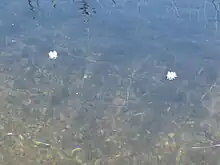Aponogeton ranunculiflorus
Aponogeton ranunculiflorus, the Sehlabathebe water lily, is a tiny and endangered species[3] of aquatic plant, that belongs to the pondweed family Aponogetonaceae. It is protected in the Sehlabathebe National Park in the mountains of Lesotho, where it is very localised,[3] and nearby in the uKhahlamba / Drakensberg Park of KwaZulu-Natal, South Africa.[1] Outside these areas it is seriously threatened. It is found in sandstone rock pools, up to 7 metres deep, and in permanently wet tarns or sensitive high altitude mires,[1] at altitudes between about 2,600 and 3,200 metres. Its spiralled stems allow the flowers to remain at surface level.[3] Threats to the species include overgrazing and trampling by cattle, overburning, erosion and subsistence farming.[1] Their small (1 cm) corms can survive the drying out of the pools, or being frozen into the muddy bottoms.[4]
| Sehlabathebe water lily | |
|---|---|
 | |
| Scientific classification | |
| Kingdom: | Plantae |
| Clade: | Tracheophytes |
| Clade: | Angiosperms |
| Clade: | Monocots |
| Order: | Alismatales |
| Family: | Aponogetonaceae |
| Genus: | Aponogeton |
| Species: | A. ranunculiflorus |
| Binomial name | |
| Aponogeton ranunculiflorus | |
References
- L. Agenbag.; C.R. Scott-Shaw (2010). "Aponogeton ranunculiflorus". IUCN Red List of Threatened Species. 2010: e.T185336A8391050. doi:10.2305/IUCN.UK.2010-3.RLTS.T185336A8391050.en. Retrieved 20 November 2021.
- Jacot Guillarmod, A.; Marais, W. (1972). "A new species of Aponogeton (Aponogetonaceae)". Kew Bulletin. 27 (3): 563–65. doi:10.2307/4114366. JSTOR 4114366.
- Wickison, Sue. "Aponogeton ranunculiflorus". suewickison.com. Retrieved 6 March 2015.
- Jacot Guillarmod, A. (1978). "Notes on distribution and biology of Aponogeton ranunculiflorus". Kew Bulletin. 32 (4): 781–83. doi:10.2307/4109774. JSTOR 4109774.
